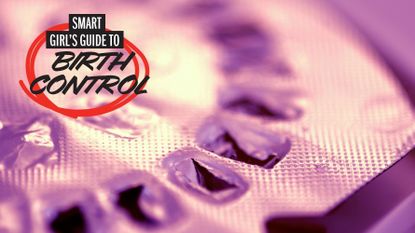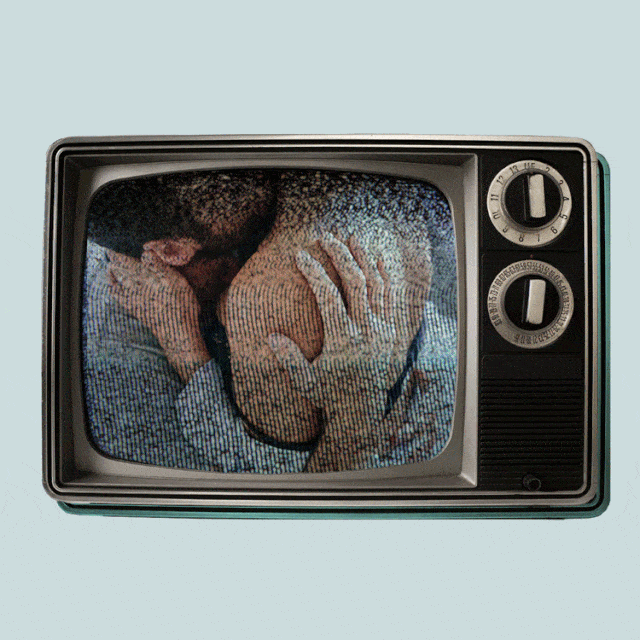


Another morning, another daily dose of estrogen and progestin. The classic birth control combo Ortho Tri-Cyclen has been my ride or die buddy since I was sixteen, and I have long loved the freedom and peace of mind it has afforded me. And yet, as I creep toward the platinum anniversary of my affair with The Pill, I'm starting to wonder if maybe it's time to call it quits.
There's no real problem, per se. I'm not thinking about having kids yet, but I'm uncomfortable that I've been running on hormones for almost two decades. By my rough estimation, there have been 222 natural menstrual cycles I've never had. I've had these full-strength hormones pumping in my veins for so long that I have no idea what my body would be like without them. I could break out. Have horrible periods. Succumb to fits of hormonal rage. The idea of who I might become without the pill's hormonal regulation has me terrified, so I sat down with my gynecologist, Dr. Elena Kamel of Chicago's Northwestern Medical Group, for a frank discussion of what my life might be like on the other side of the pack.
The idea of who I might become without the pill's hormonal regulation has me terrified.
Let's start with the bad news. "There may be an increased risk for cervical cancer in women who have had long-term exposure to the pill," Dr. Kamel informs me, noting that the medical community doesn't necessarily understand why this is. Less mystifying, however, is the higher rate of breast cancer seen with long-term use. "It's probably the estrogen exposure," says Dr. Kamel. The estrogen dosing in my pill is ever so slightly higher than a lower-hormone option; not a huge difference, but women often opt for a lower option because the less estrogen in your system, the better. Going off the pill won't immediately fix the problem, either. "That risk level took time [to reach]," explains Dr. Kamel, noting that it may take five or ten years for me to return to normal risk levels. The pill has also put me at an increased risk for blood clotting. Oof.
Dr. Kamel reminds me that the pill has been doing me favors since I was a teen, though. "It protects you against ovarian cysts and endometriosis. The longer you're on, the more it protects against both uterine and ovarian cancers." Kamel thinks the pros outweigh the risks. Because the pill prevents ovulation, my little egg machines are basically dormant—the lack of activity means I'm avoiding the hormones and processes that put me at risk. "You bleed a little" on the pill, says Dr. Kamel, but "there's not a lot of hormonal stimulation, so [there's] less chance for uterine cancer."
My period now is easy street, lasting just a couple of days, with almost zero cramping and a barely-there flow. I could be in for a rude awakening, says Dr. Kamel. "Your body will ovulate like it used to. Your periods may be heavier, and they may be more painful. You may see a dramatic change in how your body handles menses, because with the pill, everything was camouflaged," she explains. For all I know, my natural cycle could be 24 or 33 days. It'll take three to six months to come back to normal, she says.
My mental state might be a crapshoot, too. I'm a moody gal, no question, and I'm nervous about what emotional garbage might be unleashed. That's a risk I'll have to take, says Dr. Kamel. "You're definitely going to feel different," she cautions. How I feel different, however, is anyone's guess. Some women say they feel like themselves on the pill; others say the exact opposite. (I'm willing to bet that after 19 years, "feeling like myself" means taking the pill.)
"You may see a dramatic change in how your body handles menses, because with the pill, everything was camouflaged."
Thankfully, there are some things that I wouldn't have to worry about, like weight fluctuations. "There is very little data to show that women gain weight" when they go on or off the pill, according to Dr. Kamel. "It's a very individualized issue," she says. "Most people don't have any change when they come off."
Stay In The Know
Marie Claire email subscribers get intel on fashion and beauty trends, hot-off-the-press celebrity news, and more. Sign up here.
For all the answers Dr. Kamel helpfully provides me, there are still a few uncertainties (like, say, will I succumb to hormonal rage?). That said, I'm starting to feel okay about the idea of going off—and I'll never find out if I don't try. I'm realizing that my fears are actually a reflection of how little I actually know about myself. At 35, I'd like to have a better idea of how my body really works. Armed with a little knowledge, I'm ready to amicably part ways with the pill.
Thinking about going off the Pill? Here's what you need to know.
This article is part of the Smart Girl's Guide to Birth Control package of the June issue of Marie Claire, on newsstands now.
Jessica is a contributing editor at Marie Claire and the Editor-at-Large at Jezebel. She loves naps, restaurants and travel—she gets antsy if she doesn't fly somewhere at least once a month. She lives in Chicago with her husband.
-
 Olivia Rodrigo Finds the Perfect Spring Dresses at Reformation
Olivia Rodrigo Finds the Perfect Spring Dresses at ReformationShe's worn the brand twice in the past week.
By Julia Marzovilla Published
-
 Curiously, Just as Meghan Markle Sends Samples of Her New Strawberry Jam Out, the Buckingham Palace Shop Starts Promoting Its Own Strawberry Jam on Social Media
Curiously, Just as Meghan Markle Sends Samples of Her New Strawberry Jam Out, the Buckingham Palace Shop Starts Promoting Its Own Strawberry Jam on Social MediaThe clip promoting the Buckingham Palace Shop’s product—we cannot make this up—is set to Mozart’s “Dissonance Quartet.”
By Rachel Burchfield Published
-
 Zendaya's Latest 'Challengers' Serve Is Nearly a Century Old
Zendaya's Latest 'Challengers' Serve Is Nearly a Century OldThe 1930s-era dress may have been pulled months ago.
By Halie LeSavage Published
-
 The 22 Best Vibrators, According to Sex Toy Experts
The 22 Best Vibrators, According to Sex Toy ExpertsThe best options, for every preference and price range.
By Gabrielle Ulubay Last updated
-
 The Best Period Sex Tips, According to Sex Experts
The Best Period Sex Tips, According to Sex ExpertsWho says messy can't be sexy?
By Gabrielle Ulubay Last updated
-
 The 20 Best Sex Games for Couples in 2023
The 20 Best Sex Games for Couples in 2023Who said game nights need to be wholesome?
By Gabrielle Ulubay Last updated
-
 The 14 Best Lubes for Every Need
The 14 Best Lubes for Every NeedGood sex should always go smoothly.
By Gabrielle Ulubay Last updated
-
 COVID Forced My Polyamorous Marriage to Become Monogamous
COVID Forced My Polyamorous Marriage to Become MonogamousFor Melanie LaForce, pandemic-induced social distancing guidelines meant she could no longer see men outside of her marriage. But monogamy didn't just change her relationship with her husband—it changed her relationship with herself.
By Melanie LaForce Published
-
 100 Sex Songs That Won't Make You Cringe
100 Sex Songs That Won't Make You CringeDim the lights and hit play on this sex songs — the perfect playlist of songs to have sex to.
By The Editors Published
-
 75 Real Sex Scenes in Movies
75 Real Sex Scenes in MoviesThese actors aren't faking anything.
By Mehera Bonner Last updated
-
 33 Unexpected Valentine's Day 2023 Date Ideas
33 Unexpected Valentine's Day 2023 Date IdeasA.k.a. not dinner and roses.
By The Editors Published